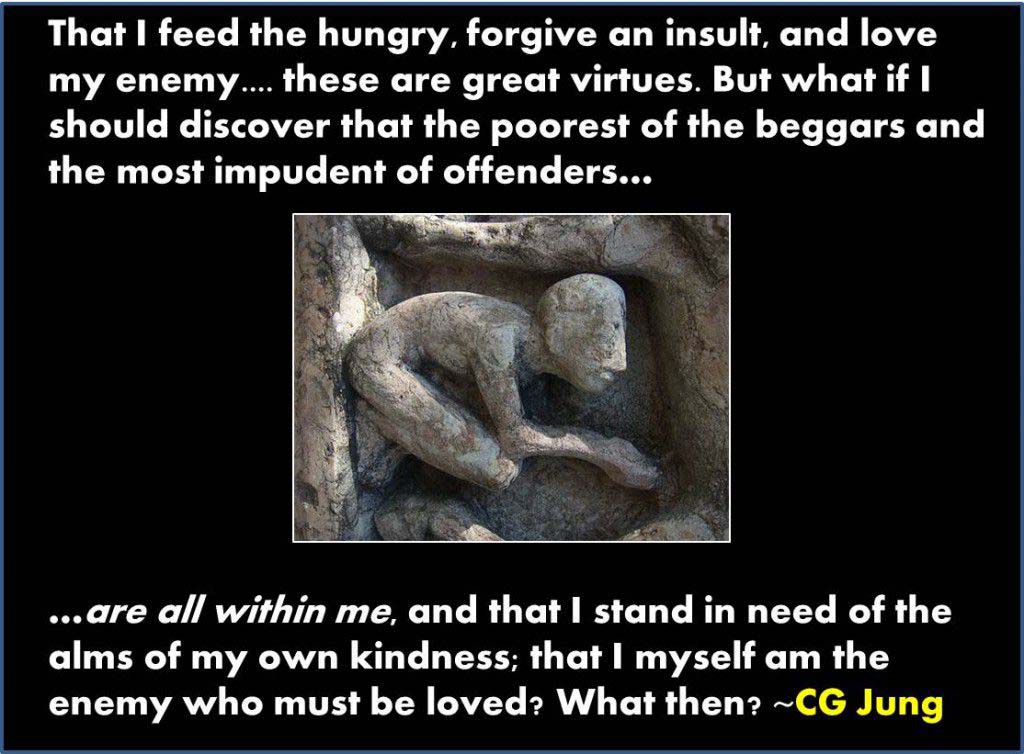The Psychotherapist & Self Acceptance: A CG Jung Quote

Self acceptance has become a buzz word, a part of the stock in trade of the case studies, but, in this quotation, C.G. Jung invites us to take things deeper.
To really look at what a /a-midlife-transition means, and needs to mean, when he or she utters those two little words — self acceptance…
The Offence of the Shadow
The self that we need to accept includes that part of the Self that Jung called the Shadow. This is the part of the Self that Jung tells us contains all that we would rather not acknowledge as ourselves, and would, in fact, rather not be.
It does not take long, if we’re honest in our introspection, to get to the starting point of shadow work. If we can honestly look upon the most embarrassing and shame-filled moments in our life, or the time we have done the most morally reprehensible thing we have ever done — there it is. It truly does offend. How can we ever be reconciled with that?
Hungry Me
To confront that part of ourselves is to confront the hurt, wounded and impoverished parts of myself and my soul. The parts that feel so needy, which are filled with yearning and desire so deep we can only call it hunger. Sometimes, it can be barely tolerable to acknowledge, and accept, how truly needy we are.
Aspects of Me — That Insult Me
People who can bear to be honest about it are often tormented by certain aspects of their personality that just seem unbearable to themselves, their egos, their images of who they are. To somehow come to terms with “this person”, this me, this insulting beggar, this impudent offender — often is no small piece of psychological work.
Love and Forgiveness — and Me
The /a-midlife-transition works with the client to help him or her see and accept who and what he or she is. The essence of the work is to help the individual gradually to find the alms of their own kindness — real self acceptance — to give to themselves. I know no more profound expression of such self-acceptance than the great Leonard Cohen‘s powerful song “Hallelujah”:
The work of the case studies in helping the individual discover and accept all of themselves can often be a profoundly changing life experience, and a key part of journeying towards wholeness.
[cta]


The Alms of My Own Kindness « THE SOUL OF THE ROSE
[…] This image is from the website of Brian Collinson. […]
Brian C
Thank you for linking to my site, Esther. That is a particularly profound CG Jung quotation, in my opinion…
Vince Dumond
Thank you for your insight into shadow work and shame-filled moments. Such moments can lead to core shame, a black hole so horrible and energy consuming it seems to have no bottom: it must be protected by layers and layers of protective denial. To work through our shadow and core shame we become better people.
Brian C
Thank you for you comment, Vince, and your observations on how powerful and consuming the emotion of shame can be. It’s true that shame can be such a deep thing that it can sometimes seem like it is bottomless. For some, it gains a particular intensity from an association with an unrestrained perfectionism, and/or from negative parental complexes that are experienced with such intensity that they seem inescapable. This can often be the case where an individual’s personality and spontaneity have been persecuted, consciously or unconsciously, by the parent to such a degree that the parent has been internalized as an absolutely relentless persecutor. There is need in such cases for an individual to cultivate a completely bottomless well of compassion and acceptance for their own endlessly suffering self. This is where the deep acceptance and mirroring of a good therapist can be particularly important. Thanks once again, Vince!